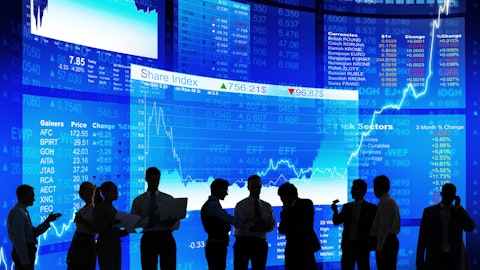Value investors have been complaining about the overvaluation in the equity markets for a very long time. Shiller’s cyclically adjusted P/E (CAPE) currently stands above 27, similar to where it stood in May 2007 near the top of the 2007 housing bubble. We should note that CAPE stood at 43 at the peak of the 2000 stock market bubble, so it isn’t at extreme levels. Other market participants claim that stocks aren’t very expensive compared to long-term bonds.
Ten year Treasury bond rate doubled since this July (from 1.3% to 2.6% today), yet stock prices kept going up. This baffles several investors including a Canadian value investor, Trapeze Asset Management’s Randall Abramson, whose funds have $300 in assets under management. In this article, we will share his latest views about the markets as well as individual stocks. Surprisingly he sees a lot of value in two of the following four stocks: Alibaba Group Holding Limited (NYSE:BABA), Apple Inc. (NASDAQ:AAPL), Amazon.com, Inc. (NASDAQ:AMZN), and Facebook Inc. (NASDAQ:FB).
Apple Inc shares kept up with the overall increase in the stock market since Trump’s election victory, whereas Facebook Inc, Amazon.com Inc, and Alibaba Group Holding Limited actually delivered negative returns. Before getting into Trapeze Asset Management’s take on these stocks, we want to share a few excerpts from their investor letter that lays out their take on the overall stock market.
“Everything feels a little backwards. President Trump getting more unsavoury in his behaviour yet managing nonetheless to win the election, despite polls to the complete contrary. The Chicago Cubs winning too. U.S. stock markets hitting all-time highs and, though fully valued, active investing being completely shunned in favour of passive. Many bonds carrying negative yields. Relative debt levels surpassing those prior to the Great Recession yet the volatility index, a measure of fear, near its lows.
And in the financial world, the most bizarre occurrence recently has been the rally in the stock markets post election. The market suffered 9 consecutive down days through early November as it dealt with rising interest rates and the uncertainty around the election results. Why the run-up post election when so many forecast a rout? Likely, for a number of reasons. What financial markets despise more than just about anything is uncertainty. With the outcome known, the markets readjusted. Furthermore, Trump’s initial comments were somewhat conciliatory, tempering nervousness. But the primary driver of the market boost came from rising interest rates—a result of foreigners selling U.S. government bonds and rising inflationary expectations. The rate of 10-year U.S. Treasuries rose from a multi-year low of around 1.3% in July to 1.8% pre-election and then post-election have jumped further to 2.4%. This is a boon to financial service companies whose earnings are dependent on higher rates on their float. So most financial stocks rocketed ahead, as did health care stocks that had previously fallen in anticipation of a Clinton win. The contribution of these 2 sectors set the tone for the overall market where gains have been relatively widespread. The spectre of lower corporate tax rates has helped too, especially for small caps—mostly domestic companies—where the Russell 2000 recently completed a 15-day consecutive winning streak.
At the same time, growth in the world economy seems to be accelerating again. Even in the Eurozone. China is in faster growth mode too.
And as this bull market has risen since ’09, one of the longest cycles, it is no longer a bargain, trading in line with our estimate of fair market value. Bonds could once again create competition for stocks, although money has recently been pulled out of Government bonds at a record pace, and into stocks. Rates have likely moved too far too fast. So it wouldn’t surprise us to see rates actually fall temporarily, though Trump’s plans, once implemented, will likely increase the federal debt from an already extended $20 trillion, ultimately causing inflation and interest rates to rise more rapidly.
…Our TRIM™ stock market indicators, which warned earlier in the year, are back on buy in most regions. Though, after the recent market run-up, we are on the lookout for a market correction, which in a bull market has averaged about 6%. While a correction could start at any time, we continue to scour for bargains. Our own screens, where we look for stocks trading for 85 cents-on-the-dollar or less, are providing the least number of potential investment opportunities in some time—another reason a correction could be close.
Meanwhile, with an earnings yield of 6%, even with 10-year Treasuries up to 2.4%, stocks are relatively more attractive than bonds. Albeit, should rates rise much above 3%, without a meaningful boost in corporate earnings, the relative attractiveness of stocks would dissipate. While a stock market correction could occur at any time, we still believe any decline in the near term will likely be modest and that growth and equity prices should continue higher, although likely at a below average pace.”
Trapeze Asset Management isn’t very enthusiastic about the stock market right now and actually expect a small correction. One of the stocks it still finds attractively priced is Apple Inc (AAPL). Here is what they have to say about Apple Inc:

“We have grown accustomed to how quickly market sentiment shifts for Apple. Despite its continued dominance of high-end smart phones, envious margins, and incredible successes achieved in new markets (its 1½ year-old watch business is now the second-largest watch brand in the world, behind only Rolex), investors once again aren’t paying the business the respect we feel it deserves. Its lowly 10x forward earnings multiple, excluding net cash, reflects this as does its discount to our $135 FMV estimate. A potential tax hiatus may allow a repatriation of a large portion of the company’s overall cash balances—now over 25% of the company’s market cap. With a large percentage of users still using the iPhone 5 and 6, we see huge pent-up demand for the iPhone 8 which we expect to be a totally new design in ’17.”
Can you guess which of these three stocks -Alibaba Group Holding Limited (NYSE:BABA) Amazon.com, Inc. (NASDAQ:AMZN), and Facebook Inc. (NASDAQ:FB)- Trapeze Asset Management likes? We will reveal the answer next:
Even though Alibaba Group Holding Limited (NYSE:BABA) was the biggest loser among these three stocks since the election, Trapeze Asset Management’s Randall Abramson doesn’t think it is undervalued. He is also on the same boat with David Einhorn regarding Amazon.com Inc.
“We like Facebook too as it’s fallen to a floor in our proprietary work and is sufficiently undervalued to now warrant our attention. We don’t consider the other two you mentioned undervalued at this time. The election didn’t really impact our view of these particular positions though Facebook, unlike the market, hasn’t moved, which is partly why there’s a potential buying opportunity,” Abramson said in an email conversation.
Amazon.com Inc., Facebook Inc., and Apple Inc are the three most popular stocks among 700+ hedge funds tracked by Insider Monkey at the end of September. On the other side, Alibaba has witnessed the biggest jump in hedge fund popularity during the third quarter. Even though Randall Abramson likes only two of these stocks and he seems very cautious these two names. He finished his investor letter with the following warning:
“President Trump’s plans for tax cuts, infrastructure spending and, potentially welcoming U.S. corporations to repatriate $2.5 trillion parked overseas should stimulate growth. And growth should cause corporate earnings, capital spending and consumer demand to rise—a virtuous cycle. But as we have said, this trend may be offset by higher interest rates and wage costs and greater foreign competition for a high U.S. dollar. The market giveth and the market taketh away.”





